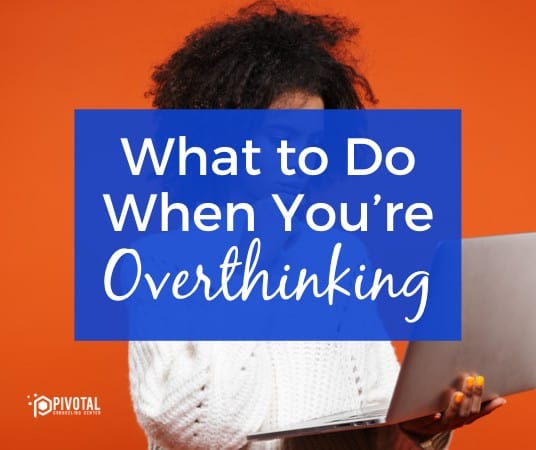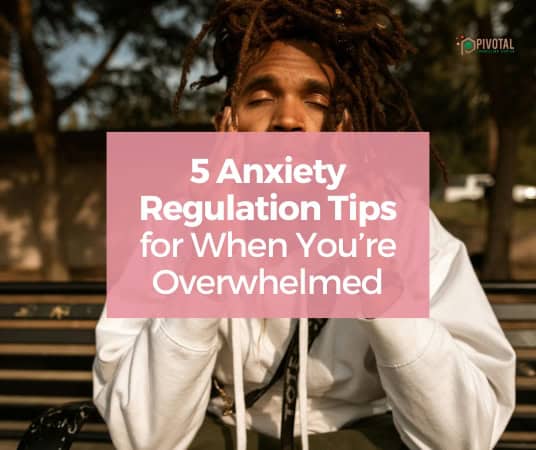
Do you feel like you tend to overthink situations?
We all overthink sometimes. Overthinking isn’t something that can be diagnosed, but it’s when you think about something too much or for too long. Overthinking can be related to anxiety, but just because you overthink doesn’t mean you definitely have anxiety, and not everyone with anxiety struggles with overthinking. Like so many things when it comes to mental health, it depends on the person.
Sometimes, our thoughts get going so fast that it’s hard to put a stop to them. One thought leads to another and another and before you know it, you’re down a rabbit hole of thoughts and you don’t even remember where you started.
Overthinking isn’t just time consuming. It can lead to changes in mood, difficulty making decisions, second-guessing yourself, social difficulties, and it’s also really tiring. Overthinking saps up a lot of your mental energy that could be better spent focusing on things that make you feel happy or content.
Why do we overthink?
There are thought patterns that we all engage in sometimes called cognitive distortions. A cognitive distortion is a pattern of thinking that is faulty or inaccurate. Examples of cognitive distortions include:
- Catastrophizing – fixating on the worst possible outcome
- Filtering – ignoring all of the positives of a situation and only focusing on the negative
- All or nothing thinking – something is either “good” or “bad”, there are no shades in between
- Personalization – blaming yourself for events that are out of your control
- Ruminating – continuously thinking the same thought or string of thoughts over and over
Overthinking can be related to cognitive distortions like the ones listed above, where you get stuck in a pattern of thinking that isn’t based on fact. Instead of being able to recognize when these cognitive distortions come into play, they’re so habitual to us that we don’t even notice them most of the time.
So what can you do when you’re overthinking? Here are 4 tips:
Notice when overthinking starts
The first step to doing anything about overthinking is to notice when it’s happening. If you don’t notice when your overthinking begins, it’s hard to interrupt it before it gets out of control. Start with an attitude of curiosity and compassion toward yourself and try to notice when you start overthinking.
What are the signs that your brain is getting carried away without you? Is there a sense of unease in your body, or an inability to relax? How do you feel when you’re overthinking and it comes to your attention? Try to get as familiar as you can with the feelings and sensations that go along with overthinking for you.
Give yourself a distraction
Sometimes, distraction is an immensely helpful coping tool. It’s not always helpful or feasible to distract yourself from everything that causes you distress, but distraction can help with overthinking. Once you’ve gotten more comfortable identifying when you’re overthinking, try adding in a distraction to help pull you out of the thought spiral. Some distractions that may be helpful when you get stuck overthinking are:
- Moving your body (yoga, dance, running, etc.)
- Cooking
- Playing a video game
- Calling a friend
- Gardening
- Watching TV or a movie
- Playing with your pet
- Taking a nap
- Working on a hobby
See what works for you and have a plan ready for the next time you get stuck in your own thoughts so you can distract yourself.
Check your thoughts
Not all of your thoughts are true or based in reality. Remember the cognitive distortions we discussed earlier? When those faulty patterns of thinking come up, it’s important to try to check whether your thoughts are true or false before they get carried away. What is truly going on? Take all emotion out of it and describe the situation. What is the evidence that what you’re thinking about will happen? Is what you’re thinking about even something you can control?
Checking your thoughts can help break those habitual patterns that lead you into overthinking.
Give yourself dedicated time for thinking
It’s going to be hard to shut off your brain after you’ve gotten in the habit of overthinking. Give yourself a dedicated time where you can think so you can still meet that urge when you feel it. Make sure there’s a set time limit and stick to it. If it’s helpful, write down your thoughts as they come up. When you’re in this time block, you can ruminate or worry if you need to, but the second time is up, tell your brain that it’s time to move on. If it’s hard to move out of your thoughts, try distracting yourself with one of the options listed above.
Are you looking for more support with overthinking? Working with a therapist can help give you tools and insight to change the negative thought patterns you’re used to. Get in touch with us today to get started.
Pivotal Counseling Center is now accepting Medicaid including Blue Cross Community Medicaid, Meridian Medicaid, and Molina Medicaid for outpatient counseling.









